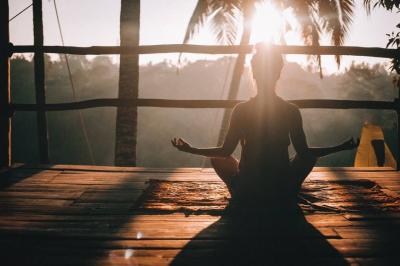The popularity of "meditation" as an effective means of relaxation and enhancing mental health has surged amid the COVID-19 pandemic, especially with meditation practices becoming accessible in the virtual world through free or paid applications. This has served as a safe haven for hundreds of thousands of people worldwide seeking tranquility and comfort.
Results from a scientific study led by Global Advances in Health and Medicine showed that participating in a single virtual meditation session helped reduce participants' anxiety, alleviate their stress, and promote feelings of calm and balance. Conversely, an increasing body of research indicates numerous health benefits from regular meditation practice, ranging from five to twenty minutes; such benefits include improved sleep quality, combating depression, aiding in appetite control and weight loss, and enhancing brain size and intelligence.
Neuroscientist Sara Lazar from Harvard Medical School found that meditation serves as an elixir for eternal youth, with consistency in practice being the key. Her study revealed that experienced meditators aged 40 to 50 possess the same level of gray matter as individuals in their 20s and 30s. The same study indicates that meditation alters the brain's shape, with Professor Lazar explaining that it takes only eight weeks to change our brain's structure, including increased gray matter in the central nervous system. This gray matter primarily comprises the majority of nerve cell bodies in the brain, specifically in areas responsible for muscle control, sensory perception, emotion, memory, decision-making, and self-regulation.
**What Are the Types of Meditation?**
All types of meditation lead to an increase in alpha and theta brain waves and the balance of hormones affecting the body. Some of the most common types include:
- **Guided Meditation:** Known as guided imagery, this involves forming mental images and using as many senses as possible, such as smells, sights, and sounds, often led by a guide or teacher.
- **Mindfulness Meditation:** This type focuses on awakening the mind, increasing awareness, and accepting the present moment by concentrating on experiences during meditation, such as the flow of our breath and observing our thoughts and feelings without judgment.
- **Qigong:** Part of traditional Chinese medicine, this practice generally combines meditation, relaxation, physical movement, and breathing exercises to restore and maintain balance.
- **Tai Chi:** A gentle form of Chinese martial arts that performs a series of movements in a slow and graceful manner while practicing deep breathing.
- **Transcendental Meditation:** A simple technique involving the repetition of a specific phrase, word, or sound in a designated way. This type allows the body to settle into a state of deep relaxation while enabling the mind to achieve inner peace without needing to use focus or effort.
- **Yoga:** A series of controlled movements and breathing exercises aimed at enhancing the flexibility of the body and mind while navigating postures that require greater balance and focus.
**Tips for Beginners in Practicing Meditation:**
- There is no right or wrong way to meditate; one can start with small meditations for a few minutes each day and gradually work on relaxation and practice slowly as improvement evolves.
- Focusing attention is one of the most critical elements of meditation, aiding in freeing the mind from various distractions, and one can focus the mind on a specific object like an image, symbol, or on the breath.
- Breathing relaxation can be achieved by repeating a process of deep and even breathing using the diaphragm to expand the lungs. The purpose is to slow down the breath and increase oxygen intake.
- Finally, practicing meditation may be easier when conducted in a quiet place with minimal distractions. It is advised to meditate in the morning under sunlight amid nature, in a comfortable position for the body and spine.




